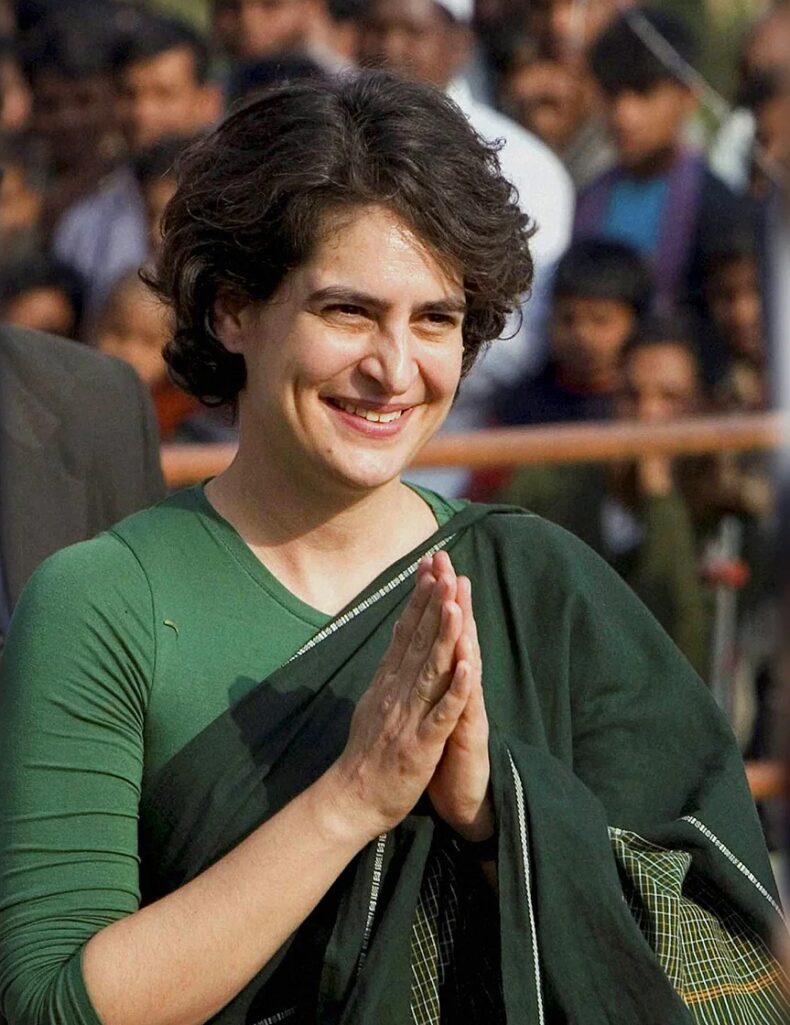In a political landscape that thrives on statements, speculations, and strategies, one assertion has captured the attention of the nation recently. Sanjay Raut, a prominent figure within the Shiv Sena faction led by Uddhav Balasaheb Thackeray, has thrown a captivating proposition into the mix. He claims that if Congress leader Priyanka Gandhi were to contest the upcoming Lok Sabha election from Varanasi, the stronghold of Prime Minister Narendra Modi, victory would be inevitable. This bold claim has ignited a frenzy of discussions and debates across the political spectrum. Let’s delve into the significance and implications of Raut’s statement in a landscape where every move and countermove can shape the nation’s future.
A Battle of Titans: Priyanka Gandhi vs. Narendra Modi
Sanjay Raut’s assertion hinges on a simple yet profound idea – the will of the people. According to him, the citizens of Varanasi are yearning for a new representative, and Priyanka Gandhi fits the bill perfectly. This proposition is not merely about politics; it symbolizes the power of voter sentiments and the desire for change. In the heartland of Indian politics, where Narendra Modi has reigned supreme for years, Raut’s claim challenges the aura of invincibility surrounding the Prime Minister. The notion that even in Modi’s bastion, the winds of change could blow, showcases the vibrancy of democracy.
Varanasi: Where History and Politics Converge
Varanasi, the spiritual and cultural epicenter of India, plays a unique role in the political theatre. It’s not just a constituency; it’s a statement. With Prime Minister Modi representing Varanasi, the region has gained immense significance. Raut’s assertion underscores the question of how deep the connection between the people and their representative truly runs. Can Priyanka Gandhi’s charisma and appeal create a dent in this unshakeable relationship? The idea is not merely about the seat; it’s about challenging established narratives and offering a fresh perspective to the electorate.
Beyond Varanasi: Implications for Indian Politics
Raut’s statement reverberates beyond the city’s borders. He suggests that constituencies like Raebareli, Varanasi, and Amethi, which have been political fortresses, might be experiencing a sea change. This assertion hints at a changing political landscape where regional dynamics, voter sentiments, and individual leadership qualities are challenging established norms. While Priyanka Gandhi’s hypothetical entry into Varanasi is the focal point, Raut’s words subtly speak to the larger narrative of how the dynamics of Indian politics are evolving.
Comparing Apples and Oranges: Raut’s International Analogy
By drawing a comparison between Priyanka Gandhi’s challenge in Varanasi and the meeting between former Pakistan Prime Minister Nawaz Sharif and PM Modi, Raut creates an interesting juxtaposition. He raises the question – if two leaders from historically strained nations could meet, why not leaders within India? While this analogy is intriguing, it also serves as a reminder that politics, both domestic and international, is a complex web of relationships and alliances. It remains to be seen how such comparisons influence public perception and the discourse surrounding political interactions.
Intra-Coalition Dynamics: A Peek Behind the Curtains
Raut’s assertion about the Deputy Chief Ministers of Maharashtra being dissatisfied with the current government brings to light the underlying tensions within the ruling coalition. The mention of Ajit Pawar, who switched allegiances and joined the BJP-Shiv Sena-led government, hints at the fragility of political alliances. This glimpse into the internal dynamics provides insights into the challenges and complexities that leaders navigate to maintain cohesion and power within their parties.
The Gandhi Factor: Shaping Congress Strategy
Sanjay Raut’s statement triggers discussions about the role of charismatic leaders in political parties. Priyanka Gandhi’s entry into the electoral arena in Varanasi would not merely be a strategic move but a declaration of intent. Her connect with the masses and the rejuvenation she could potentially bring to the Congress party is a subject of interest. Her challenge in Varanasi could set the tone for Congress’s approach to the upcoming elections, emphasizing a renewed focus on strong candidates and innovative campaigning techniques.
Redefining Invincibility: The Power of Symbolism
The aftermath of Raut’s statement reminds us that in politics, perception matters. Even if Priyanka Gandhi’s challenge in Varanasi does not come to fruition, the idea of contesting against a strong incumbent like Narendra Modi sends ripples through the political landscape. It questions the assumption of invincibility that often surrounds powerful leaders. If Varanasi, considered a fortress, becomes a battleground of ideas and leadership, it could inspire other opposition parties to adopt similar strategies in their strongholds.
The Verdict: The Ripple Effect of Raut’s Claim
In a country where political developments can change the course of history, Sanjay Raut’s claim about Priyanka Gandhi’s potential challenge in Varanasi is a reminder of the ever-evolving nature of Indian politics. The proposition resonates with the democratic spirit, where no seat is impenetrable, and every vote matters. Whether Raut’s prediction materializes or not, the very act of challenging a powerful incumbent in his own domain is a testament to the spirit of democracy – a dynamic, unpredictable, and resilient force that shapes the destiny of nations.
Sanjay Raut’s assertion regarding Priyanka Gandhi’s hypothetical challenge in Varanasi has set the stage for an intriguing political discourse. This claim is not just about an electoral battle; it’s about the collision of ideologies, the power of symbolism, and the unpredictable journey of democracy. As the nation watches with bated breath, the outcome of such a contest could potentially redefine the way we perceive political dynamics in India – where even the strongest fortresses are not immune to the winds of change.












